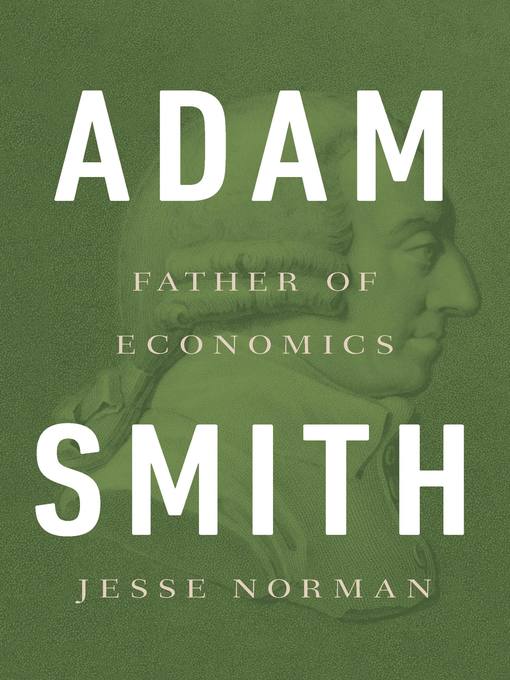
Adam Smith
Father of Economics
کتاب های مرتبط
- اطلاعات
- نقد و بررسی
- دیدگاه کاربران
نقد و بررسی

July 9, 2018
Norman (Edmund Burke: The First Conservative) takes aim at the carapace of myth that obscures the real legacy of Smith, the Scottish thinker whose Wealth of Nations, first published in 1776, outlined the functioning of a modern market economy. Too often, Norman argues, Smith has been wrongly seen as the progenitor of laissez-faire capitalism, an economic libertarian, and a misogynist whose careful calculations of supply and demand leave no room for the hidden household labor of women. To counter this vision of the boy from Kirkcaldy as a market fundamentalist, Norman provides a thoughtful and accessible overview of Smith’s work interspersed with historical context on the Scottish Enlightenment. He argues convincingly that Smith’s greatest insight was his notion of mutual sympathy, the human ability to imagine ourselves in the place of others and thus reflect in turn on our own behavior, and it is this reciprocal vision of social interaction, rather than the narrow self-interest typically associated with Smith, that is the true basis for market exchange. Indeed, Smith was more interested in morals than money and would have condemned the crony capitalism and income inequality that dominate contemporary economic life. This is a stimulating introduction to an often misunderstood figure in the history of economic thought.

July 15, 2018
Parliamentarian Norman (Edmund Burke: The First Conservative, 2015, etc.) enlists Adam Smith (1723-1790) and the Scottish Enlightenment in the cause of moral capitalism.Having written of Edmund Burke as an intellectual founder of modern conservatism, the author now reckons with Smith, the great Scottish student of markets and consumer behavior. What are those markets, and what are they for? As the author notes, we don't ask the right questions "about norms and culture and the role of the state." Above all, the market assumes trust and consent: It cannot function well if those who are engaged in it do not trust one another and willingly enter into exchange, which, of course, is a problem in a market stained by crony and predatory stripes of capitalism, the capitalism that "flourishes where companies and markets lose their connection to the public good." Following Smith, who wrote of the "moral sentiment" that underlies our supposedly self-interested interactions in the marketplace, Norman holds that while a free market should indeed be free, that does not mean that it should not be regulated. The playing field should be level, the barriers to entry uniform, the market a place not just of exchange, but also a moral community that hinges "on people who are not merely legally free but free in the full exercise of their capabilities." Markets, he adds in what will be anathema to libertarians, are often improved by state intervention, especially of the sort that keeps insiders from ripping off outsiders. Following Smith again, he even endorses paying one's taxes, though taxes must be used to public good, for "inefficient taxes increase bureaucracy, undermine the incentive to the productive, encourage smuggling and create vexation."It's hard to imagine an American politician writing with the same depth and grasp of an inordinately complex subject, but Norman pulls it off quite capably. A worthy addition to the literature surrounding Smith and that of modern conservative thought.
COPYRIGHT(2018) Kirkus Reviews, ALL RIGHTS RESERVED.

August 1, 2018
Norman (Edmund Burke: The First Conservative) turns his attention to economist and philosopher Adam Smith (1723-90), creating a splendid introduction to his life and lasting influence. The author draws on established scholarship--including seminal works by Ian Simpson Ross, Knud Haakonssen, and Nicholas Phillipson--but provides a balanced synthesis that challenges historiographical "myths" and offers new insight by placing Smith in far-ranging historical, philosophical, and political-economic contexts, including the Scottish Enlightenment. Smith's friendships with philosophers David Hume and Edmund Burke are fully explored; Norman writes that Smith's "genius is to have set out the field of political economy with markets at its centre...with insights that continue to inspire economists across an astonishing range of fields today." VERDICT This scholarly and well-crafted book will impart pleasure and knowledge to a range of readers, from the uninitiated to seasoned scholars and policymakers. Highly recommended.--Mark Spencer, Brock Univ., St. Catharines, Ont.
Copyright 2018 Library Journal, LLC Used with permission.

























دیدگاه کاربران